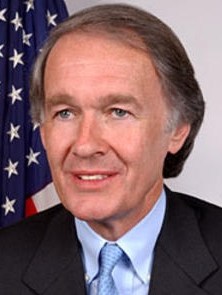 Earlier this year, some Stop the Cap! readers in North Carolina who attended the hearings on a pro-telecom (actually it was written by them) piece of legislation designed to stall statewide municipal broadband competition encountered strange protests from conservative groups arriving on buses. They were there to stop “Obama’s government takeover of the Internet.” The communities of Wilson and Salisbury, which have municipal broadband projects in progress, also encountered resistance from outside groups. Salisbury residents even began receiving biased phone polls that turned out to be sponsored by a conservative political action group that was also involved in the conservative “tea party” movement.
Earlier this year, some Stop the Cap! readers in North Carolina who attended the hearings on a pro-telecom (actually it was written by them) piece of legislation designed to stall statewide municipal broadband competition encountered strange protests from conservative groups arriving on buses. They were there to stop “Obama’s government takeover of the Internet.” The communities of Wilson and Salisbury, which have municipal broadband projects in progress, also encountered resistance from outside groups. Salisbury residents even began receiving biased phone polls that turned out to be sponsored by a conservative political action group that was also involved in the conservative “tea party” movement.

"Critics say .... it appears that the group was a 'mouthpiece' for hire." -- St. Louis Post-Dispatch
These groups loaded mostly retirees, recruited from talk radio and websites, onto buses and sent them to the state capital with generic anti-government talking points and signs.
FreedomWorks, which is currently in the news for organizing protests at town hall meetings over what they call “Obamacare” health care reform, has also been busy adopting the industry-friendly position of opposing government involvement in broadband. They oppose anything resembling regulation, any government involvement in the pricing or availability of broadband service, and recite industry talking points about the free market assuring Americans of the world’s best Internet service. Unfortunately, these talking points come at the same time the United States slips further and further behind in international broadband rankings, and true competition in most markets is limited at best.
FreedomWorks’ position on broadband policy will sound eerily familiar:
The broadband market is dynamic and fast paced; new FCC regulations could hamper this growth and reduce the vital capital investments required to expand the nation’s broadband networks. Rather than attempting to apply old monopoly based models to today’s competitive markets, the FCC should focus on removing barriers to competition, implementing competitive solutions to policy questions, and allowing the private sector to more effectively allocate scarce broadband resouurces [sic] to the most highly valued uses. In addition, efforts to establish “net neutrality” should be avoided, because they threaten the ability to manage dynamic networks effectively.
That is paraphrased directly from the talking points the industry has presented about broadband policy for years.
Now many of these groups are attempting to recruit those who dislike the current administration to provide free shilling services for the broadband industry’s agenda, supporting positions that are directly opposite consumers’ best interests.
FreedomWorks is hardly new at this. Back in 2006, Fiona Morgan, writing for the Independent Weekly (North Carolina), covered another bandwagon of protesters who showed up at an arcane meeting of the North Carolina House Revenue Laws Study Committee, all wearing FreedomWorks t-shirts:
The details of telecom legislation like this are wonky, complicated and jargon-filled. But that hasn’t dampened the passions of citizens fed up with the de facto monopoly of TimeWarner, with its astronomical rates for “packages” of unwatched channels. Dozens of people from across the state showed up to a meeting in April of the House Revenue Laws Study Committee wearing T-shirts for FreedomWorks, a group clamoring for the proposed state franchises. FreedomWorks, which is connected with the anti-tax conservative group Citizens for a Sound Economy, is funded by telephone companies pushing for the bill–what you might call an Astroturf (phony grassroots) organization, but the passion of its members is very real.
With astroturfers like FreedomWorks, deregulatory principles that might garner legitimate debate and consideration are tainted when it turns out that advocacy is bought and paid for by directly connected business interests who have a dog in the fight. That’s why FreedomWorks hardly represents the “grass roots.” It’s an astroturfer that has a corporate-sponsored agenda, but hides behind good American conservative citizens who find themselves proverbially loaded onto buses and taken for a ride.
Those consumers had a right to be fed up with paying for unwatched cable channels, but their appearance at that meeting was the lowest form of manipulation, because the legislation under review had nothing to do with the issue those people were concerned with.
Instead, their presence was used by the telecommunications industry as illustrative of consumer discontent, and de facto support for their real agenda, which was removing oversight of the video service franchising process from local government and turning it over to an industry-friendly state body. That would have created statewide cable and “telco TV” franchises that take away local control and oversight.
Chad Johnston of the People’s Channel, Chapel Hill’s public access station said all the passion around TV service is being used to mislead the bill’s supporters. “It’s funny, because many of the comments that the FreedomWorks folks brought up in this meeting were things that aren’t even included in this bill, like being able to chose your channel lineup–that’s a whole different issue,” Johnston says. “This notion that it’s going to bring us gobs of choices and lower prices it totally false, based on everything we know about deregulation and the telecom industry.”
Now, another astroturf group that shares “researchers” with FreedomWorks, the so-called Heartland Institute, has an Op-Ed Tuesday in the conservative Philadelphia daily The Bulletin. Of course, the Heartland Institute also has close ties not only to big telephone companies, but is a dependable friend of big cable as well. Those close ties are, predictably, omitted from the article.
A typical horror story involves an ISP, at peak usage hours, gently slowing down a tiny number of bandwidth hogs so the vast majority of its customers can surf the Web and send emails at the speed they expect. Insisting such a policy is unfair is not only counterintuitive, it’s counterproductive to demand the government stop it.
The Internet Freedom Preservation Act of 2009 is poorly named because it would do nothing to preserve freedom. HR 3458 would strip ISPs of the right to manage traffic on the networks they have spent billions to build, market and manage. In their place would emerge a cadre of detached government bureaucrats—hardly an improvement on the status quo.
The takeaway word from the first section is “story,” as in fiction, because that is what that talking point represents. Once again, the Us vs. Them strategy reveals itself, with stories of some guy next door sucking the neighborhood Internet lines dry downloading. The true horror is some providers continue to earn healthy profits on their broadband revenue, complain about the growth of traffic on their networks, and actively reduce investment to expand that network. That, of course, helps build the case for “controls” when consumers notice the slowdowns created by those neglectful policies.
The Heartland Institute advocates the provider be given the enviable role of the fox guarding the hen house. Providers manage profits quite effectively, and just as some try to tweak pricing models to extract extra revenue from consumers, you can count on those same providers creating new revenue streams from “premium” prioritization of Internet traffic, for a price, while leaving everyone else in the slow lane. Their own products and services carried on those lines will enjoy beneficial priority for free while direct competitors find they can’t obtain that level of service at any price.
The so-called “cadre of government bureaucrats” is anything but. The truth is, there will be one set of clearly defined standards that will protect the level playing field the Internet deserves. The piece makes it sound like there will be a government court to render judgment on every policy and practice, which is false. The only thing Net Neutrality protects IS the status quo, a free and open Internet.
Today, if a broadband customer does not approve of the way an ISP manages Web traffic, he can readily switch to a competitor more to his liking. ISPs have an enormous financial incentive to retain existing customers and attract new ones, so the free market encourages best practices.
Tell that to Canadians who are enduring not only Internet Overcharging schemes like usage caps and consumption billing, but also throttled speeds that artificially reduce (by up to 99%) the advertised speed for certain applications, all for “good network management.” Don’t like the throttle from Bell on your DSL line? Switch to Rogers Cable and get more of exactly the same thing. A free market cannot truly exist from the monopoly most rural residents face for broadband, and the duopoly most of the rest of us endure. The current market doesn’t encourage “best practices;” it encourages informal collusion by providers who learn not to rock the boat, especially on competitive pricing.
ISPs have an enormous financial incentive to find ways to increase profits, which is precisely what Internet Overcharging is all about.
But under HR 3458, if a broadband customer is not satisfied, what near-instant recourse will he have? None after government forces every ISP to operate “equally” by replacing market-based incentives with bureaucratic mandates. This would ensure an inevitable slide to “equally” shoddy service.
One would assume a provider would want to make their service as robust and up to date as possible, yet in a world without codified Net Neutrality protections — the free market at work under today’s reality — we’re seeing continued evidence of price increases and a decline in investment in networks, and some providers continue to drag their feet on upgrades. The only market based incentive at work here is the demand from Wall Street for greater revenue and return from providers, who face challenging times in their video and telephone businesses, but can always leverage the success of the broadband division. Broadband continues to maintain customer loyalty, and the potential for greater return from price increases and forcing costs down by limiting service.
Net neutrality advocates want the government, not “the public,” to control the fate of the Internet. The ordered chaos of market forces may scare those who don’t understand it. But the market is efficient, quickly responsive to the needs and wants of consumers, and—in the proper sense of the word—free.
Actually, Net Neutrality advocates want the government to protect the “chaos” of the online world as it exists today. Those who want to “organize” or “order” the online world aren’t Net Neutrality advocates, they are providers who don’t want people using “my pipes for free,” or cable interests who want to “organize” online video around a model they own and control, or who simply want to throw a Money Party by inventing new ways to charge people more money for exactly the same service they get today.
The claim that the market is “quickly responsive” to the needs and wants of consumers is demonstrably false for any consumer living in Wilson or Salisbury, North Carolina, where a duopoly of providers refused to provide the level of broadband service consumers and small business clamored for, so local municipalities finally threw up their hands and decided to build networks themselves. Residents of Rochester, New York are threatened with a broadband backwater because the incumbent telephone company Frontier Communications has shown little interest in providing a fiber optic based 21st century broadband platform similar to one being constructed in virtually every other city of size in New York. Customers even signed petitions begging Verizon to overbuild the Flower City to provide the service Frontier will not.
In April, Time Warner Cable “responded to the needs and wants of consumers” by attempting to ram an Internet Overcharging experiment down the throats of customers in four American cities, where not one consumer either needed or wanted such massive price increases. Over a period of weeks, this provider did everything but respond to customer needs, until a wholesale consumer revolt erupted and Congress intervened.
The free market is working well for groups like FreedomWorks and The Heartland Institute, who enjoy healthy support from the telecommunications industry. In return, finding where the telecommunications industry positions end and FreedomWorks’ positions begin is like staring into a mirror and trying to ascertain the differences between the reflection and yourself.


 Subscribe
Subscribe






